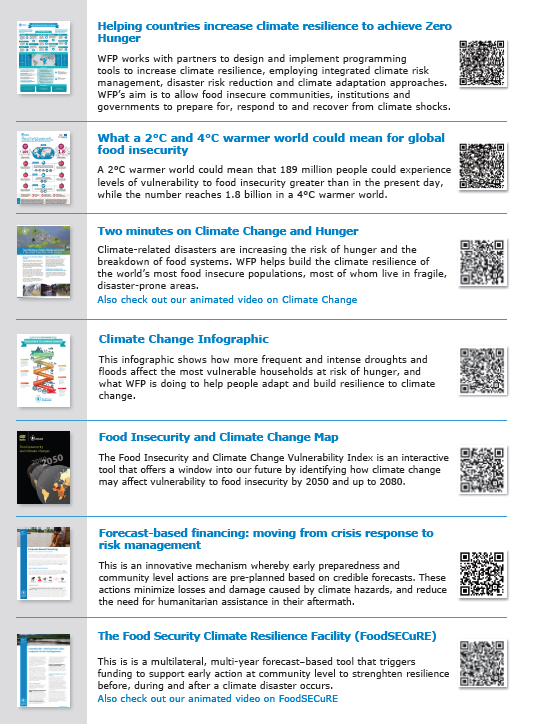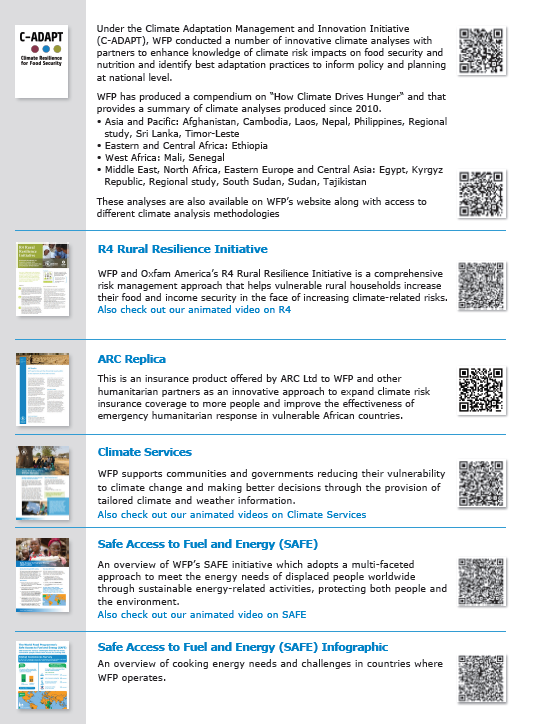Zero Hunger in a warming world
As the UN's annual Climate Change Conference is kicking off in Katowice, Poland, the World Food Programme (WFP) highlights climate change as one of the key drivers of hunger.
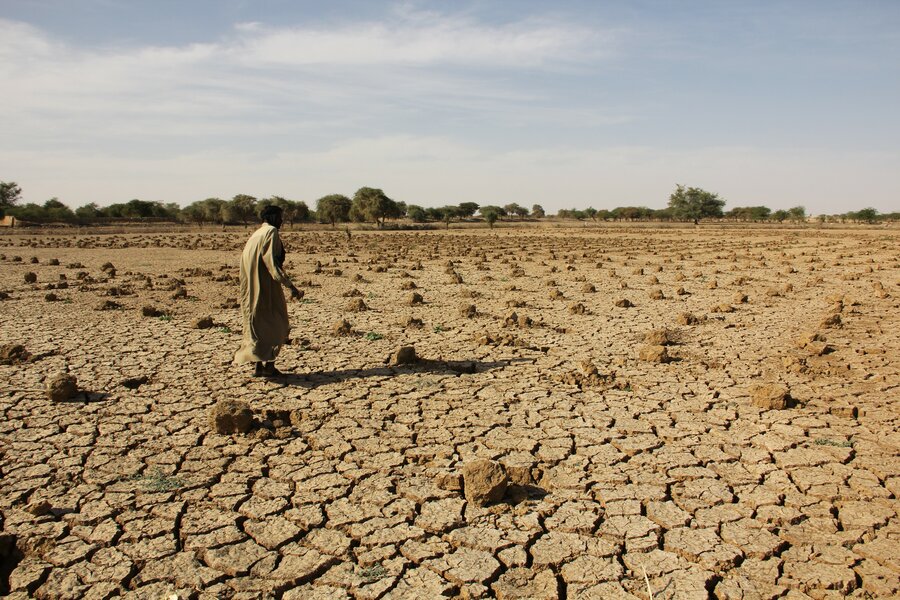
The impacts of climate change are already being observed globally. The globe has warmed by 1 °C above pre-industrial levels due to human activities, and this is affecting livelihoods, ecosystems and food security all over the world. Further warming beyond 1.5 °C is projected to lead to higher risk of food shortages, including in humanitarian hot spots such as the Sahel and southern Africa, and in disaster-prone regions in Latin America and the Mediterranean.
Research by WFP and the UK Met office projects that a world that is 2°C warmer is likely to have 189 million more people at risk of food insecurity than today. A temperature increase of 4°C is projected to put at risk 1.8 billion more people.
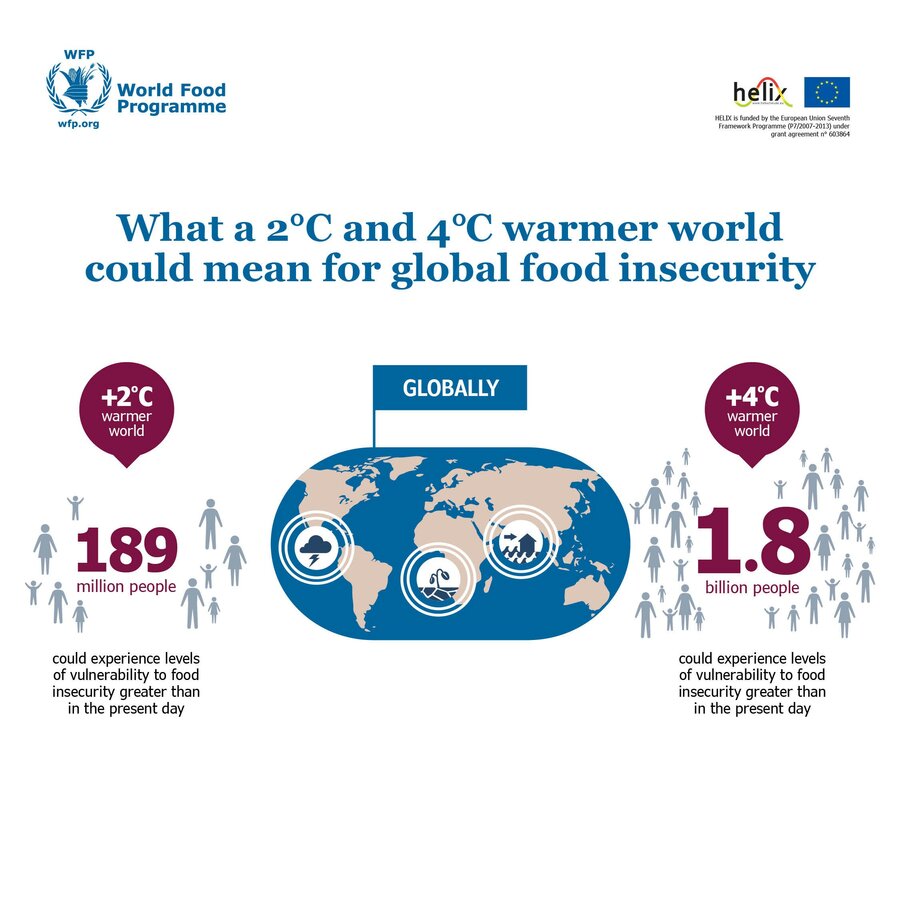
The results from the IPCC Global Warming of 1.5°C report confirm that the world is presently not on track to achieve the goal of the Paris Agreement to limit global warming to well below 2ºC since pre-industrial times, and that more concrete, ambitious and decisive action is urgently needed. COP24 is of critical importance because it will focus on finalizing the Work Programme for the Paris Agreement, putting into place practical implementation guidelines which need to track and ensure progress in an atmosphere of mutual trust between governments. Through establishing this Work Programme, the international community can take the transformative actions required to limit warming to 1.5˚C and prevent the most extreme effects that are projected in a warming climate.
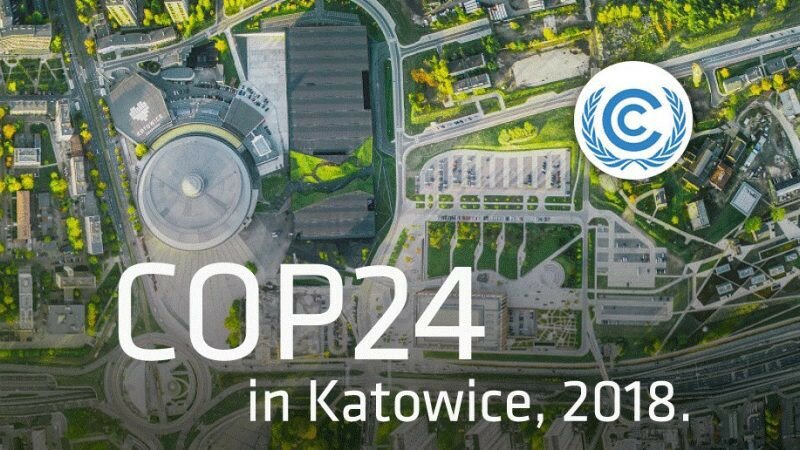
WFP' s presence at Katowice is focusing on three key objectives, aiming to ensure that food security remains part of the agenda at COP24 ahead of the implementation of the Paris Agreement:
1. Follow and provide input on important policy discussions related to food security in a changing climate;
2. Advocate for communities and governments whose food security is under threat from climate change;
3. Engage in bilateral meetings with donors and the media to position WFP as a leading organization on climate risk management.
The 24th session of the UNFCCC Conference of the Parties (COP24) is hosted by the Government of Poland and will convene in Katowice from 2 to 14 December, 2018. This annual climate change conference serves as the formal meeting of the 197 Parties the UN Framework Convention on Climate Change. The conference will assess the collective progress of countries in addressing the challenges of climate change and achieving the goal of the Paris Agreement to limit global warming to well below 2ºC since pre-industrial times.
WFP, in partnership with FAO and IFAD, will have an information booth at COP showcasing the Rome-based UN Agencies' climate actions that lead to more sustainable food systems, pursue Sustainable Development Goal 2 and push for major progress in implementing the Paris Agreement.
WFP's voice in side-events
Thursday 6 December
12:00–13:30
Comprehensive risk management strategies to secure livelihoods for all — BMZ
This side event is organized by the German Federal Ministry of Economic Cooperation and Development and aims to discuss comprehensive risk management approaches as part of global efforts to address climate change risk in the short term. WFP will present experiences related to ARC replica policies in Mali and Mauritania.
Friday 7 December
14:30–16:00
Urban Futures Day
The side-event, organized by the Nordic Council of Ministers, will highlight the challenges of creating sustainable food consumption in cities, with the perspective of linking rural and urban trends, including the longer-term food security implications of urbanization.
Monday 10 December
11:00–15:30
InsuResilience Partnership Forum Panel Discussion, "Lessons learned from existing schemes"
Exploring successful ways to promote climate and disaster risk finance and insurance solutions, making them more effective in support of a global resilience agenda. The panel will focus on implementation and practical action from existing successful schemes.
InsuResilience Partnership Forum Working Session, "West Africa — A Model to Shift from Responding to Disasters to Managing Risks — the example of ARC Replica"
This session will explore how humanitarian actors can support and leverage sovereign level climate risk insurance to enable quicker and more effective humanitarian responses, through the lens of the two-year Africa Risk Capacity (ARC) Replica pilot in West Africa.
Monday 10 December
13:15–14:45
Fighting Climate Change Requires Zero Tolerance on Food Loss and Waste. Room Pieniny.
This Rome-based Agencies side event will aim at highlighting that a sustainable transformation of global food systems is possible by exploring diverse examples of food loss and waste, from national governments reduction initiatives, the private sector and civil society; unpacking some of the complexities of food systems thinking and the interlinkages between SDG 12, SDG 2 and SDG 13, based on the experiences shared.
Tuesday 11 December
18:30–20:00
UN side event "SDG 5: Gender mainstreaming in adaptation and mitigation: A nexus approach".
FAO, on behalf of the Rome-based Agencies, will provide an overview of joint interventions that considers gender, climate change and agriculture nexus.
Wednesday 12 December
15:00–16:00
SOFI Report Side-Event, "The State of Food Security and Nutrition in the World: Building Climate Resilience for Food Security and Nutrition"
Organized by WFP, FAO, WHO, UNICEF and IFAD. A 45' event in the form of a media interview with the collaboration of journalists, interviewing senior FAO, WFP and/or IFAD staff members on the SOFI 2018 findings and way forward on climate resilience for food security and nutrition.
Thursday 13 December
11:30–13:00
Rome-based Agencies Side-Event, "We can still end hunger by 2030 if we take ambitious climate action":
A discussion on the relationship between climate change adaptation and mitigation, food security, food systems and the right to food; and the transformative systemic changes, actions and measures required in the agriculture sectors and food systems to meet both climate and development goals, which will require raising the ambition at the national and international level.
Resources
Click here to download our publications, or come to visit us in the Zero Hunger Booth at COP!
